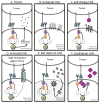Engineered T cells: the promise and challenges of cancer immunotherapy
- PMID: 27550819
- PMCID: PMC5543811
- DOI: 10.1038/nrc.2016.97
Engineered T cells: the promise and challenges of cancer immunotherapy
Abstract
The immune system evolved to distinguish non-self from self to protect the organism. As cancer is derived from our own cells, immune responses to dysregulated cell growth present a unique challenge. This is compounded by mechanisms of immune evasion and immunosuppression that develop in the tumour microenvironment. The modern genetic toolbox enables the adoptive transfer of engineered T cells to create enhanced anticancer immune functions where natural cancer-specific immune responses have failed. Genetically engineered T cells, so-called 'living drugs', represent a new paradigm in anticancer therapy. Recent clinical trials using T cells engineered to express chimeric antigen receptors (CARs) or engineered T cell receptors (TCRs) have produced stunning results in patients with relapsed or refractory haematological malignancies. In this Review we describe some of the most recent and promising advances in engineered T cell therapy with a particular emphasis on what the next generation of T cell therapy is likely to entail.
Figures





References
-
- Disis ML, et al. Existent T-cell and antibody immunity to HER-2/neu protein in patients with breast cancer. Cancer Res. 1994;54:16–20. - PubMed
-
- Billingham RE, Brent L, Medawar PB. Quantitative studies on tissue transplantation immunity. II. The origin, strength and duration of actively and adoptively acquired immunity. Proc R Soc Lond B Biol Sci. 1954;143:58–80. - PubMed
Publication types
MeSH terms
Substances
Grants and funding
LinkOut - more resources
Full Text Sources
Other Literature Sources
Research Materials

